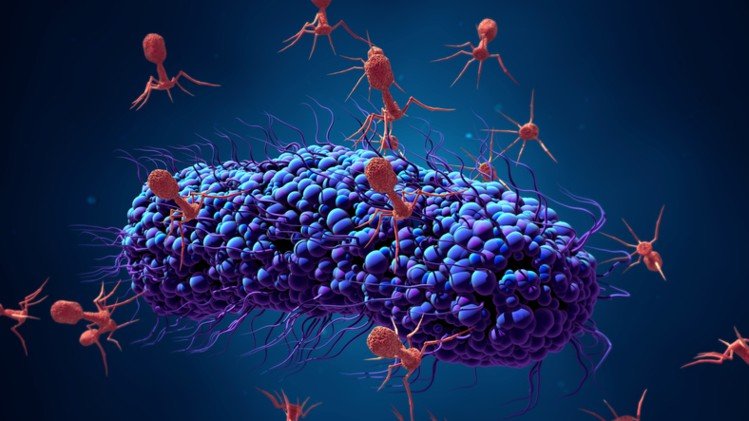Special Issue 1: Bacteriophage Therapy
Are phages alternatives to antibiotics? Please see below the recent research advances in bacteriophage therapy.
Testimonial: Little girl’s ‘miracle’ cure
The Westmead Institute for Medical Research (WIMR) laboratory that Dr Lin is part of is the first in Australia to run a clinical trial of phage therapy for people with superbug infections. Dhanvi is one of 13 patients who received the treatment and her mother described the result as a miracle.

Superbugs have an arsenal of defences – is there a way around them?
-
- Each year in Australia, 180,000 patients suffer infections that prolong their hospital stays, increase costs, and, sadly, increase the risk of death.
- New research in Australia, published in Nature Microbiology, has established a way to revert antibiotic resistance in one of the most dangerous superbugs. It involves the use of viruses that kill bacteria: phages
- Acinetobacter baumannii is the superbug responsible for up to 20% of infections in intensive care units. It attaches to medical devices such as ventilator tubes, and urinary and intravenous catheters. It causes devastating infections in the lungs, urinary tract, wounds and bloodstream
- Phage therapy has already been used in patients with life-threatening infections, with successful results. This study highlights the possibility of using phages to rescue antibiotics and to use them in combination.
Link to full article here: Monash University, 12 January 2021
Bacteriophage has an important role in agriculture and aquaculture
Key points:
-
- Crop plants and animals can be infected by bacterial pathogens that reduce yield, cause food wastage, and carry human pathogens that spread disease on consumption.
- Bacteriophage can play an important role in microbial control, according to a new Special Issue on Agriculture and Aquaculture published in the peer-reviewed journal PHAGE: Therapy, Applications, and Research. Click here to read the issue.
- “Although the number of problems associated with bacterial diseases in agriculture and aquaculture has increased, food producers are under pressure to reduce their reliance on antibiotics. There is therefore a clear need for effective antimicrobials to prevent and treat infections in food animals, to both reduce food waste and prevent human infection. Clearly if developed properly, phages can at least in part, help to solve this need,” says Martha Clokie, PhD, Editor-in-Chief of PHAGE and Professor of Microbiology, University of Leicester.
Link to full article here: EurekAlert, 4 January 2021
Trial to Test Phage Therapy for Chronic P. aeruginosa Infections
Key points:
- P. aeruginosa is a bacteria that can cause serious lung infections in people with CF. While antibiotics can effectively treat some infections, many bacteria evolve resistance to commonly used antibiotics, which can make treatment difficult.
- A Phase 1/2 clinical trial, called CYPHY, to evaluate the phage therapy YPT-01 in treating chronic Pseudomonas aeruginosa infections in people with cystic fibrosis has been initiated at Yale University. This double-blind, placebo-controlled study (NCT 04684641) aims to enrol 36 adult patients with these chronic infections.
- “If the data from this trial reflect earlier human data showing safety and efficacy, we will focus on moving this asset into a larger commercial trial as soon as possible,” said Rob McBride, CEO of Felix Biotechnology.
Link to full article here: Cystic Fibrosis News Today, 12 January 2021
Bacteriophage Therapy Market Update 2021
Key points:
- A new market report by The Insight Partners on the Bacteriophage Therapy Market has been released with reliable information and accurate forecasts for a better understanding of the current and future market scenarios.
- The report offers an in-depth analysis of the global market, including qualitative and quantitative insights, historical data, and estimated projections about the market size and shares in the forecast period.
- One section of the report assesses the Impact of COVID 19 on the Bacteriophage Therapy Market which would mention How the Covid-19 is Affecting the Bacteriophage Therapy Industry, Market Trends and Potential Opportunities in the COVID-19 Landscape, Covid-19 Impact on Key Regions and Proposal for Bacteriophage Therapy Players to fight Covid-19 Impact.
Link to full article here: The Courier, 12 January 2021


 Report
Report
